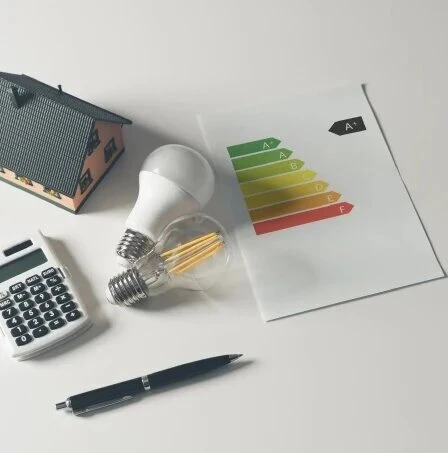If you plan to buy or sell a house, or you are in the process of looking for a house or flat to rent or let, you will come face to face at some point with Energy Performance Certificates or EPCs. But what does the EPC rating mean?
The Energy Performance Certificate, or EPC, can trace its origins to a European Union directive called the Energy Performance of Buildings Directive (EPBD) from 2003. The EPBD established design and construction standards relative to energy consumption for both new and existing buildings.
The UK government began to implement this EU directive (remember, this was pre-Brexit), in 2007 by way of the new Energy Performance Certificate. In the intervening years, the EPC has since become a central component of the government's response to the climate crisis and is used as a measuring stick of a structure's energy efficiency.
Among other things the Energy Performance Certificate indicates a building’s overall energy efficiency which is expressed on the EPC certificate by way of an A to G letter rating. An “A” rating indicates the highest level of energy efficiency, a “B” rating the 2nd highest and so on down to a G rating which represents the lowest level of energy efficiency. Each letter grade will come with a corresponding numerical score.
Potential buyers and renters have a legal right to see the EPC of the house or building they are thinking about buying or moving into. This will give them a way to guesstimate their monthly energy bills, since the worse the rating the more they can expect to pay. With this knowledge in hand, they can make an informed decision about buying or renting a particular property.
In addition, the EPC also indicates a property’s carbon dioxide emissions, or “carbon footprint”. This is becoming an increasingly important issue in today’s real estate market given the growing concern about the effects of climate change.

The following are the letter grades and numerical scores indicated on the Energy Performance Certificate:

The rating indicates where your property ranks in relation to energy efficiency and its carbon footprint. It should be no surprise that new structures routinely achieve a higher EPC rating than older buildings, some of which were built before anyone ever heard the term “climate change”.
The EPC rating is determined after the property has been thoroughly examined by a qualified assessor and is valid for 10 years from the date of issue.
After completing their examination of your property the assessor may make recommendations regarding how to improve its energy efficiency. Typical recommendations include:

Every structure in the UK must have an EPC certificate. When it comes to houses a minimum EPC rating of “E” is necessary if the owner wishes to rent or sell the property. If your property has “earned” an “F” or “G” rating you will not be able to rent or sell it until you make improvements and have the house reassessed. That’s just one of the reasons a high EPC rating is important.
Another reason is that if a potential buyer or renter is considering your home but your home has a lower EPC rating than another home they are considering, you are likely to lose that potential buyer or renter to the other property with the higher rating. Also, some mortgage lenders have begun to deny loans to those hoping to purchase a home with a poor EPC rating.
In 2018 the government instituted the Minimum Energy Efficiency Standards or MEES. MESS laid down the law that all properties being sold or rented in the UK must have an EPC rating of at least “E”.
The current “E” rating, however, is not expected to last long. Recent proposals have been introduced that would raise the minimum acceptable rating necessary to sell or rent to “C” in 2025. Should the new regulations become law they will be phased in, at first applying only to new tenancies and then, in 2028, all tenancies. This is all part of the government’s commitment to make the country a net-zero carbon country by 2050.
The rules state that all UK structures must have an EPC certificate and be entered on the EPC Register and that any home to be sold or rented must meet a certain minimum EPC rating. There are, however, exceptions to every rule, including the EPC. For example: Certain homes located in a conservation area may not need an EPC.
Also, listed buildings have been exempt from EPCs from the beginning of the program. Why? Because in order to bring a listed building up to speed with the EPC any enhancements would likely alter the appearance of the building in a significant or unacceptable way.

Contact Energy Performance Certificates to Obtain an EPC for Your Property
So what does the EPC rating mean? It means you will need to make sure your home meets certain energy efficiency standards before you put it on the market to sell or rent.
If you need an EPC for your home or business contact the experts at Energy Performance Certificates. We provide nationwide coverage, visiting more than 5,000 UK properties each month for EPC assessment purposes. Our team is prompt, friendly, professional and thorough. So call now on 0203 397 8220, or write to arrange a visit at: hello@energyperformancecertificates.co.uk.